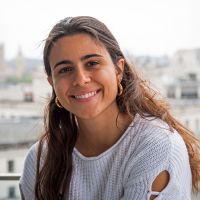7 min read
We sat down with Emma, who studied EC212: Introduction to Econometrics at Summer School, to hear about her experience of the course.
Why did you decide to attend LSE Summer School?
I was very interested in expanding my knowledge within the field of econometrics, and the course seemed perfectly aligned with this. I was also very drawn to LSE’s high-quality education and living in London for a month!
Why did you choose your course?
I am planning to pursue a Master’s in Economics and wanted a stronger foundation in econometrics, plus I find the subject really interesting and applicable to the real world!
Tell us about an average day as a student on your course.
My typical day started with a morning lecture, followed by a short lunch break, and then a small group seminar where we got more individual and focused attention. In the seminars, we either practiced problems on Stata or went over any questions we had. Since classes finished early, I usually took the opportunity to explore London and spend time with friends. One of my favourite spots was Hyde Park, where I’d walk around or enjoy evening picnics. I also loved going to the pond in Hampstead Heath to relax and make the most of the summer evenings!
What was your favourite part of your course?
Aside from meeting people from all around the world, my favourite part of the course was learning how to use Stata, a statistical software widely used in economics. It gave me hands-on experience working with real datasets, allowing me to apply what I was learning directly to data analysis. We used Stata to run regressions, visualise trends, and test for issues like serial correlation in time series data.
What advice would you give to students considering your course?
Definitely go for it! Keep up with the classes, but also remember to enjoy your time!
What are your short-term professional goals, and how does your course contribute to these goals?
My short-term goal is to complete a Master’s in Economics or Economics and Finance, with the aim of working in global economic development or at a multilateral development bank. By working with different types of regression analysis and learning how to identify and address biases in data, this course has significantly improved my ability to handle large datasets and conduct thorough analysis. I really believe these skills will be extremely useful in both my master’s studies and in practical roles within economic development.
Did you feel supported by your lecturers?
Yes, both the lecturers and my seminar teacher were very supportive, and I could always reach them via email and get fast replies.
How will the course contribute to your longer-term goals?
It gave me a deeper understanding of economics, which will be very useful to apply throughout my future career. More specifically, I learned how to work with time series data and deal with issues such as serial correlation, heteroskedasticity, and nonstationary trends, which allow me to analyse economic data more accurately and essentially make better forecasts. I also really enjoyed learning about binary response models which will can be extremely useful for risk assessments and policy evaluations, overall giving me a stronger base for data-driven decisions in the future.
Was meeting and talking to other students on your course easy?
Yes, totally! We had a Unibuddy group, a WhatsApp group, and LSE Summer School organises fun events (such as board games night, or trivia pub quiz) constantly, so it makes it easy to meet other people and catch up with those on your course both inside and outside the classroom.
What would be your top tip for future Summer School students?
Prepare a little before you start the course – it’ll make things easier! What helped me the most was going through the course outline ahead of time and making sure I had a good grasp of the key topics. That way, I could start the course with a solid foundation. I also reviewed some basic econometrics tutorials to brush up on the fundamentals, so I wouldn’t feel lost in class and could focus on learning new things.
This interview was written by one of our 2024 Student Ambassadors, who are here to share their stories and help you understand the summer school experience at LSE.

